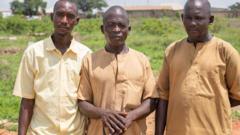For more than 50 years, the Abdullahi family has been an integral part of the Tudun Wada Cemetery in Kaduna, Nigeria, dedicated to supporting their community by caring for the final resting place of many. Until recently, they worked without formal pay, relying on small donations from grieving families for their services, which include digging graves and washing bodies according to Islamic customs.
The cemetery, established for Muslim residents a century ago, became the family's calling when two brothers, Ibrahim and Adamu Abdullahi, started working there in the 1970s. Now their sons, guided by their teachings of service and devotion to God, have taken on the responsibility. As the main caretakers, Magaji, Abdullahi, and Aliyu Abdullahi report for duty daily, ensuring burials are promptly organized, following the cultural expectations that dictate a swift burial.
Despite the physical grueling nature of the job, especially in the intense heat, they operate with diligence. On days with heavy demands, they've been known to dig upwards of twelve graves. However, the family has endured challenges, frequently during times of communal strife between the Muslim and Christian populations in Kaduna.
The transformation in their fortunes began recently when the new local council chairman recognized their long-standing contributions, placing them on the payroll. Though the payment remains below the national minimum wage, this recognition represents a significant step forward, bringing hopes for increased support and better facilities at the cemetery.
The Abdullahi family's commitment continues as they remain motivated by the service they provide, ensuring that the memories of the deceased are honored. They strive to pass this legacy of dedication to the next generation, hoping that one of the 23 children in Magaji’s family will carry on the crucial role of cemetery custodianship.





















